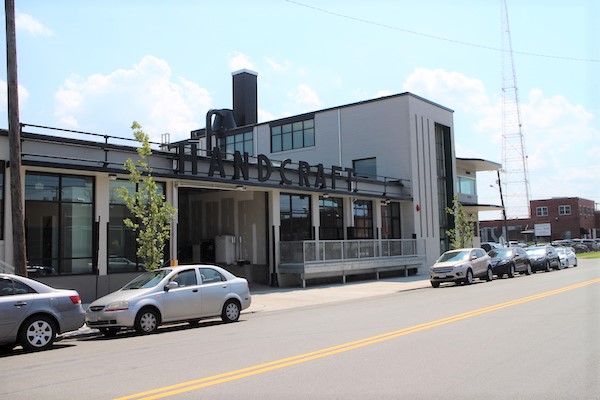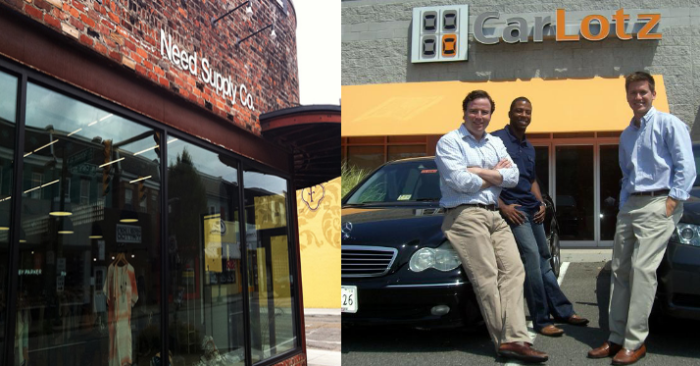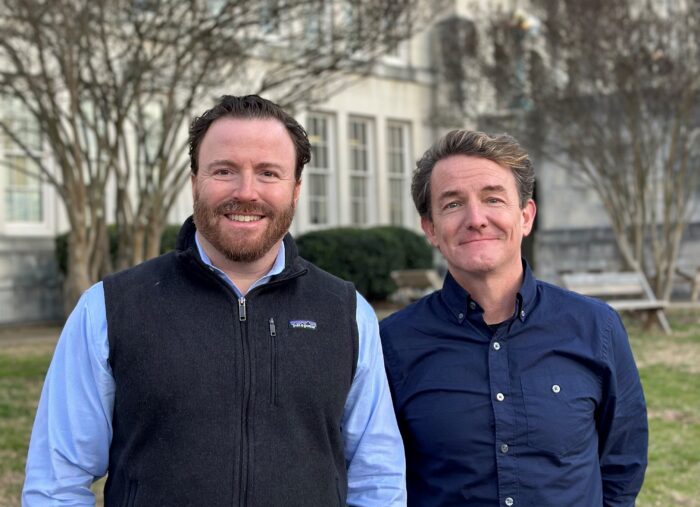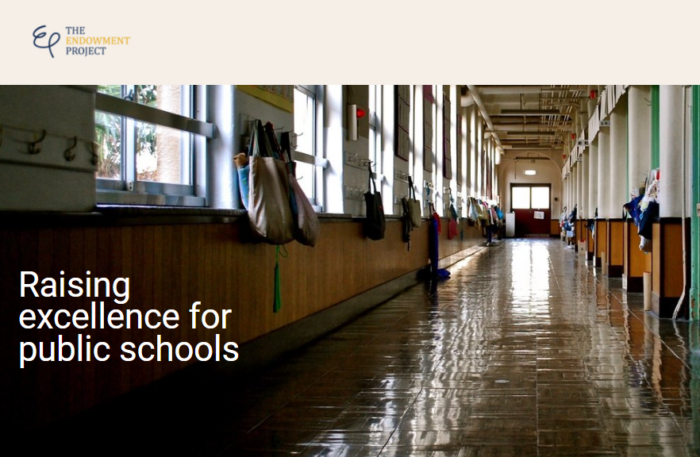It wasn’t long after Michael Bor had steered his company CarLotz through an IPO when he got a call that would eventually spark the idea for his next startup.
On the line was Phillips Academy Andover, the prestigious private high school in Massachusetts from which Bor graduated in 1992.
The timing and purpose of the school’s reaching out is what got Bor’s entrepreneurial juices flowing: The listing of CarLotz shares on Nasdaq meant an overnight windfall for Bor and some of the Richmond-based used car seller’s insiders and early investors.
“When CarLotz went public, my high school, with its very sophisticated development office, called me soon after the public listing to establish dialogue around giving,” Bor said.
Bor was struck by the fact that the academy knew to call and when to call and had the apparatus in place to make it happen. No doubt, he thought, that’s why Andover has one of the largest private school endowments in the country at more than $1 billion.
“They just do a tremendous job of staying in touch, building community and creating reasons to give, and managing the endowment and generating a great return,” he said.
Then it hit him.
“It occurred to me that that level of sophistication and function just doesn’t exist at the public high school level. I spoke to my cofounder (Will Boland), who went to Freeman (High, in Henrico), and asked him if anyone from Freeman called him. I kind of knew the answer but was curious,” Bor recalled.
Two years later, after having stepped down as CarLotz’s CEO, Bor’s hunch has become The Endowment Project. The new Scott’s Addition-based startup aims to be an alumni development company for public high schools with a goal of helping form and manage nonprofit endowments for as many of those schools in the country as possible.
By Bor’s estimation, there are 200 million people in the U.S. who went to public high schools and there are 25,000 such high schools in the country. But beyond PTAs and booster clubs, he sees major limits to their ability to raise money from all those graduates.
“Virtually none have an endowment and alumni function,” he said. “I recognized the opportunity is massive. In my opinion, the funds are out there. It’s just no one is asking for them.”
Bor isn’t going it alone. His Endowment Project cofounder is Chris Bossola, who founded and ran Richmond-based retailer Need Supply Co. until its closure in the thick of the pandemic in 2020.
The partnership started after Bor and Bossola bumped into each other in Richmond. They had previously met through the local business scene and at that moment both happened to be pondering what to do next with their careers.
Bossola said Bor at first ran the Endowment Project idea by him in passing.
“I emailed him two days later and said, ‘I can’t stop thinking about this idea and I’d love to work on it with you. Tell me to back off if I’m being too forward,’” Bossola recalled.
“The idea was really powerful and I thought could transform the public education system. It felt like the kind of thing I wanted to do next. It was very different than what I had done before. I did retail for over 20 years and I really wanted to explore something totally different,” Bossola said.
Now, with the business incorporated, a website launched and other employees soon to join, the cofounders are in the midst of raising $3 million-$4 million in capital from both local and out-of-town investors. They expect to finalize the raise before the end of the first quarter, Bor said.

The Endowment Project is based in a small office in the HandCraft building in Scott’s Addition, where CarLotz and Need Supply have both kept offices. (BizSense file photo)
They’ll deploy the capital first to build the IT side of the business and then recruit a team for nonprofit fundraising, beginning with what Bor said will be the most difficult step: creating a database of alumni from the tens of thousands of schools.
From there the company will launch a pilot program with a handful of high schools around Virginia.
Bor said they’ll reach out to the principals of those schools and then recruit alumni to sit on a board of trustees for what would become the school’s nonprofit alumni association. The Endowment Project would help form that foundation and would handle the outreach to begin raising funds for the association’s endowment from alumni, the community and corporations.
Bor said they’ll track the progress of those pilot schools through the 2025 school year and see what worked and what didn’t.
“We’re shooting to raise somewhere under $1 million per year per school for the pilot schools,” Bor said. “We think that’ll be a couple years. We’ll then expand it to 100 schools.”
The next goal would be 1,000 schools nationally within five to 10 years, when the company would reach out to large philanthropists – think Bill Gates and MacKenzie Scott – to fund mass donations to schools across the platform.
The Endowment Project, which is for-profit, would make its money from taking a percentage fee of the funds raised for each endowment and a percentage of the funds managed over time.
“We’re essentially modeling this after what runs already in society… asset managers that manage the assets of foundations,” Bor said. “That’s a level of infrastructure that today doesn’t exist,” for public high schools.
Beyond the potential business opportunity, Bor and Bossola both see a greater good in the idea, which they say is what attracted them to it.
“The thesis is that with several hundred million people that went to these schools – and it’s no secret that public education is not where society wants it to be – could funding from alumni help get public schools to a better place so that the outcomes are better than they are today,” Bor said.
Added Bossola: “I think the company could potentially shift culturally the way the U.S. thinks about philanthropy in public schools. It’s happened in colleges and private institutions and I think it’s time for it to happen in public schools.”

Need Supply’s former Carytown storefront (left). Bor and his CarLotz cofounders in the company’s early days. (File photos)
In the meantime, the two cofounders find themselves back in the familiar territory of startup mode – although it has been awhile.
Bor founded CarLotz in 2010 with Aaron Montgomery and Will Boland as a used car consignment shop. It grew to nearly two dozen locations nationwide ahead of its nine-figure IPO in 2021, before its stock fizzled, Bor was replaced and the company was absorbed by West Coast peer Shift Technologies.
Bossola started what would become Need Supply more than 20 years ago, initially selling vintage Levi’s jeans in Richmond. It grew to become a frontrunner of the Richmond retail scene, one of the region’s fastest-growing companies and internationally recognized in the fashion world, before the pandemic broke its business model and forced its closure.
But even after those abrupt endings, both say the thrill of the early days of a startup still hit home.
“The last years at a public company were tremendously stressful. I didn’t see my family much. I was dealing with all kinds of pressure,” Bor said. “I still crave the exciting aspects of a startup. I do still feel like I have the energy and ambition to create something great and something that can benefit society.”
Bossola said they wear their experiences more as badges of entrepreneurial honor to carry them as leaders into this next venture, rather than scarlet letters of failure.
“There are hundreds of lessons,” Bossola said of his time at Need Supply. “Would you rather be on a plane with someone that’s never had anything go wrong or someone who’s had all the engines go down? We’ve seen the good, the bad and the ugly.”
It wasn’t long after Michael Bor had steered his company CarLotz through an IPO when he got a call that would eventually spark the idea for his next startup.
On the line was Phillips Academy Andover, the prestigious private high school in Massachusetts from which Bor graduated in 1992.
The timing and purpose of the school’s reaching out is what got Bor’s entrepreneurial juices flowing: The listing of CarLotz shares on Nasdaq meant an overnight windfall for Bor and some of the Richmond-based used car seller’s insiders and early investors.
“When CarLotz went public, my high school, with its very sophisticated development office, called me soon after the public listing to establish dialogue around giving,” Bor said.
Bor was struck by the fact that the academy knew to call and when to call and had the apparatus in place to make it happen. No doubt, he thought, that’s why Andover has one of the largest private school endowments in the country at more than $1 billion.
“They just do a tremendous job of staying in touch, building community and creating reasons to give, and managing the endowment and generating a great return,” he said.
Then it hit him.
“It occurred to me that that level of sophistication and function just doesn’t exist at the public high school level. I spoke to my cofounder (Will Boland), who went to Freeman (High, in Henrico), and asked him if anyone from Freeman called him. I kind of knew the answer but was curious,” Bor recalled.
Two years later, after having stepped down as CarLotz’s CEO, Bor’s hunch has become The Endowment Project. The new Scott’s Addition-based startup aims to be an alumni development company for public high schools with a goal of helping form and manage nonprofit endowments for as many of those schools in the country as possible.
By Bor’s estimation, there are 200 million people in the U.S. who went to public high schools and there are 25,000 such high schools in the country. But beyond PTAs and booster clubs, he sees major limits to their ability to raise money from all those graduates.
“Virtually none have an endowment and alumni function,” he said. “I recognized the opportunity is massive. In my opinion, the funds are out there. It’s just no one is asking for them.”
Bor isn’t going it alone. His Endowment Project cofounder is Chris Bossola, who founded and ran Richmond-based retailer Need Supply Co. until its closure in the thick of the pandemic in 2020.
The partnership started after Bor and Bossola bumped into each other in Richmond. They had previously met through the local business scene and at that moment both happened to be pondering what to do next with their careers.
Bossola said Bor at first ran the Endowment Project idea by him in passing.
“I emailed him two days later and said, ‘I can’t stop thinking about this idea and I’d love to work on it with you. Tell me to back off if I’m being too forward,’” Bossola recalled.
“The idea was really powerful and I thought could transform the public education system. It felt like the kind of thing I wanted to do next. It was very different than what I had done before. I did retail for over 20 years and I really wanted to explore something totally different,” Bossola said.
Now, with the business incorporated, a website launched and other employees soon to join, the cofounders are in the midst of raising $3 million-$4 million in capital from both local and out-of-town investors. They expect to finalize the raise before the end of the first quarter, Bor said.

The Endowment Project is based in a small office in the HandCraft building in Scott’s Addition, where CarLotz and Need Supply have both kept offices. (BizSense file photo)
They’ll deploy the capital first to build the IT side of the business and then recruit a team for nonprofit fundraising, beginning with what Bor said will be the most difficult step: creating a database of alumni from the tens of thousands of schools.
From there the company will launch a pilot program with a handful of high schools around Virginia.
Bor said they’ll reach out to the principals of those schools and then recruit alumni to sit on a board of trustees for what would become the school’s nonprofit alumni association. The Endowment Project would help form that foundation and would handle the outreach to begin raising funds for the association’s endowment from alumni, the community and corporations.
Bor said they’ll track the progress of those pilot schools through the 2025 school year and see what worked and what didn’t.
“We’re shooting to raise somewhere under $1 million per year per school for the pilot schools,” Bor said. “We think that’ll be a couple years. We’ll then expand it to 100 schools.”
The next goal would be 1,000 schools nationally within five to 10 years, when the company would reach out to large philanthropists – think Bill Gates and MacKenzie Scott – to fund mass donations to schools across the platform.
The Endowment Project, which is for-profit, would make its money from taking a percentage fee of the funds raised for each endowment and a percentage of the funds managed over time.
“We’re essentially modeling this after what runs already in society… asset managers that manage the assets of foundations,” Bor said. “That’s a level of infrastructure that today doesn’t exist,” for public high schools.
Beyond the potential business opportunity, Bor and Bossola both see a greater good in the idea, which they say is what attracted them to it.
“The thesis is that with several hundred million people that went to these schools – and it’s no secret that public education is not where society wants it to be – could funding from alumni help get public schools to a better place so that the outcomes are better than they are today,” Bor said.
Added Bossola: “I think the company could potentially shift culturally the way the U.S. thinks about philanthropy in public schools. It’s happened in colleges and private institutions and I think it’s time for it to happen in public schools.”

Need Supply’s former Carytown storefront (left). Bor and his CarLotz cofounders in the company’s early days. (File photos)
In the meantime, the two cofounders find themselves back in the familiar territory of startup mode – although it has been awhile.
Bor founded CarLotz in 2010 with Aaron Montgomery and Will Boland as a used car consignment shop. It grew to nearly two dozen locations nationwide ahead of its nine-figure IPO in 2021, before its stock fizzled, Bor was replaced and the company was absorbed by West Coast peer Shift Technologies.
Bossola started what would become Need Supply more than 20 years ago, initially selling vintage Levi’s jeans in Richmond. It grew to become a frontrunner of the Richmond retail scene, one of the region’s fastest-growing companies and internationally recognized in the fashion world, before the pandemic broke its business model and forced its closure.
But even after those abrupt endings, both say the thrill of the early days of a startup still hit home.
“The last years at a public company were tremendously stressful. I didn’t see my family much. I was dealing with all kinds of pressure,” Bor said. “I still crave the exciting aspects of a startup. I do still feel like I have the energy and ambition to create something great and something that can benefit society.”
Bossola said they wear their experiences more as badges of entrepreneurial honor to carry them as leaders into this next venture, rather than scarlet letters of failure.
“There are hundreds of lessons,” Bossola said of his time at Need Supply. “Would you rather be on a plane with someone that’s never had anything go wrong or someone who’s had all the engines go down? We’ve seen the good, the bad and the ugly.”


I assume Bor would suggest HSs invest in bad concepts like CarLotz so they should avoid his advice. He wants to ‘do something great’ – how about pay back all the investors that lost money in his last failed venture
When people INVEST, they know the risks. Venture capital hits one homerun out of 9 strike outs. Investing as a common shareholder also has risks. If people do not want to ever lose their money, they need to put their money under their mattress, otherwise, as the saying goes….high risk, high return….CarLotz owes their shareholders nothing more than what is legally owed.
Bor’s expertise is investment banking, he knows how to GET the money—-let’s see if he has learned how to manage the money.
“CarLotz owes their shareholders nothing more than what is legally owed.”
The courts have not yet ruled on what exactly that is but it might be a lot:
https://richmondbizsense.com/2021/09/01/carlotz-hit-with-multiple-lawsuits-by-disgruntled-stockholders/
https://richmondbizsense.com/2022/11/10/carlotz-sued-by-disgruntled-shareholder-over-pending-shift-deal/
Personally I’d be wary about giving Bor money and trusting what he says he’ll do with it.
Judge Chin does not see it the same way you do, if only Bernie had you determining his sentence.
Investors agree to risks. They don’t agree to pay to be the victim of fraud.
You might need to clarify.
It’s an adorable attempt to clear his conscious.
Curious to know how the founders are inserting equity into this concept. Without it the schools in wealthy parts of the region will gain more assets while the schools in lower income parts of the region will remain under resourced and under funded
I came down here to the comment section to ask the very same thing.
Thats not a bug it’s a feature and a grift in my opinion. Look at what Miyares and Youngkin are doing to public schools. Public school is late with National Merit Scholar emails, open an investigation, student gets sexually assaulted at private school, crickets.
This is just part of the plan to starve public schools of funding, so they fail, then transfer tax dollars to the GOP friends who run “Christian.” schools. This fun little twist is that they will now be able to blame regular folks for “failing to Dontate to support public schools”.
The article mentions that the endowments would be non-profit, which implies that there will be opportunities to deploy donations in ways that could benefit public education. I’m interested and would guess plenty of of other public school alumni will be too. Either way, it’s better to try something than do nothing.
Resource imbalance between schools in wealthy areas versus poorer ones will be a problem no matter how this enterprise is capitalized. One way to try to address that challenge would be for them to work on the county level rather than the individual school.
Many counties nationally already have public education foundations, so that basic structure already exists in many places, including Richmond, Henrico and Chesterfield. With Endowment Project as a back office/engine room in a soundly conceived business plan, these foundations might accomplish alot more.
This is a great article Michael – it’s wonderful to see these two entrepreneurs start something together. Chris is right, all those lessons learned from their past experiences will be tremendous assets in this venture.
This is an interesting idea with potential. I don’t mean to be a naysayer, but there are a number of issues with it. I wonder if Bor and Bossola are not reinventing the wheel to some degree. For example, there is already a plethora of good endowed fund managers out there for any foundation with funds to invest. If they can actually organize the data haystack for the many millions of US public high school graduates into a database to find individual needles, that would be a huge accomplishment in itself. Surely big tech has been there already, like Facebook?… Read more »
Why don’t we just tax big corporations to fund public schools on a national level? Say a 10% tax on all stock buyback programs should do the trick.
Not a bad idea, Ed. Not at all. Something like that led to a number of things, notably, move schools away from over reliance on property taxes in their own communities, which tends to perpetuate the resource divide between rich and poor communities.
What about taxing SPAC’s and IPO’s? Could the money generated there fund public school endowments?
I recall reading on BizSense an article about local CEO raises in 2022 – Bor was at the top of the list, as I recall, he took a 350% raise at a time the company’s value was tanking. Walked away with millions of investors money. Maybe it was legal executed but not ethical in my opinion.
This is fantastic. They should check out what Boston Latin does. They have a phenomenal development program and we give to them every year. 100% public. I think the biggest issues for most public schools is that they don’t have enough money or any budgets for development teams let alone paying teachers, especially in places like VA that pay teachers in the bottom third in the US.